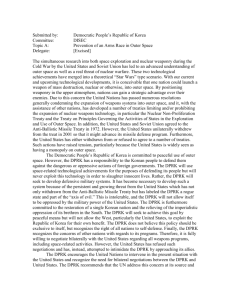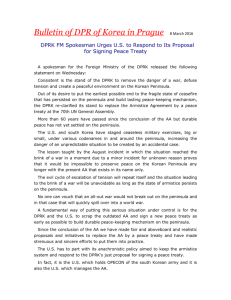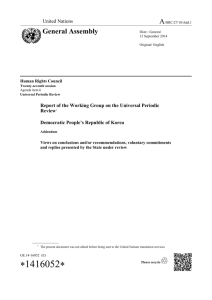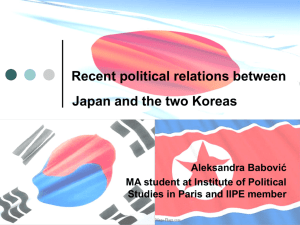B BOARD OF GOVERNORS
advertisement
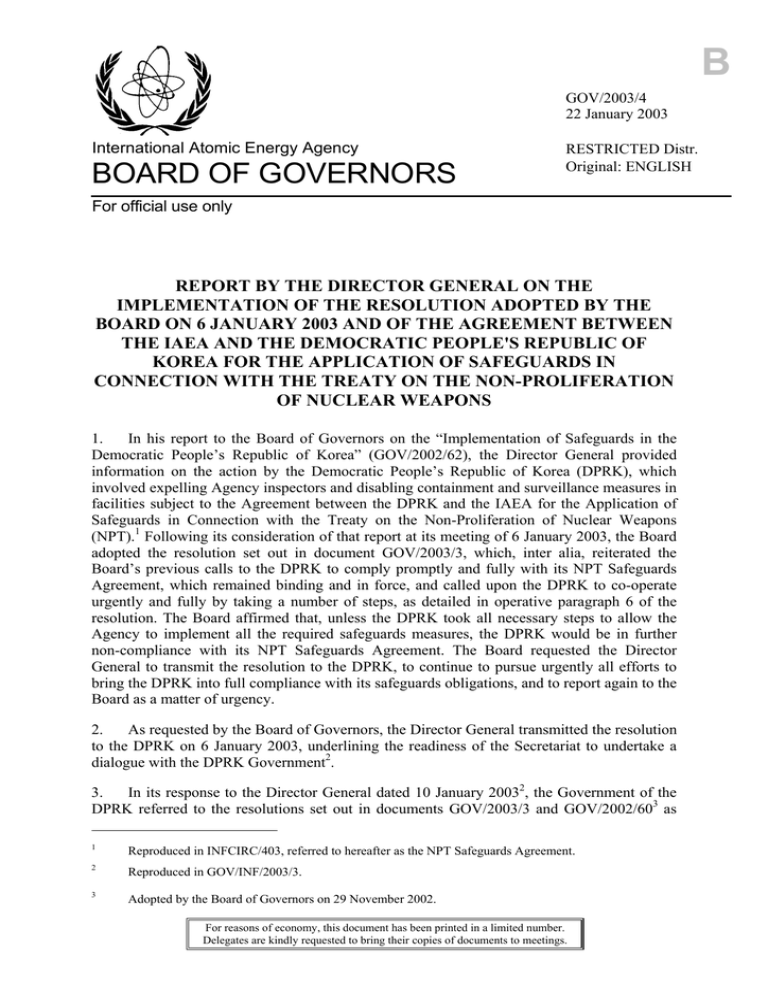
B GOV/2003/4 22 January 2003 International Atomic Energy Agency BOARD OF GOVERNORS RESTRICTED Distr. Original: ENGLISH For official use only REPORT BY THE DIRECTOR GENERAL ON THE IMPLEMENTATION OF THE RESOLUTION ADOPTED BY THE BOARD ON 6 JANUARY 2003 AND OF THE AGREEMENT BETWEEN THE IAEA AND THE DEMOCRATIC PEOPLE'S REPUBLIC OF KOREA FOR THE APPLICATION OF SAFEGUARDS IN CONNECTION WITH THE TREATY ON THE NON-PROLIFERATION OF NUCLEAR WEAPONS 1. In his report to the Board of Governors on the “Implementation of Safeguards in the Democratic People’s Republic of Korea” (GOV/2002/62), the Director General provided information on the action by the Democratic People’s Republic of Korea (DPRK), which involved expelling Agency inspectors and disabling containment and surveillance measures in facilities subject to the Agreement between the DPRK and the IAEA for the Application of Safeguards in Connection with the Treaty on the Non-Proliferation of Nuclear Weapons (NPT).1 Following its consideration of that report at its meeting of 6 January 2003, the Board adopted the resolution set out in document GOV/2003/3, which, inter alia, reiterated the Board’s previous calls to the DPRK to comply promptly and fully with its NPT Safeguards Agreement, which remained binding and in force, and called upon the DPRK to co-operate urgently and fully by taking a number of steps, as detailed in operative paragraph 6 of the resolution. The Board affirmed that, unless the DPRK took all necessary steps to allow the Agency to implement all the required safeguards measures, the DPRK would be in further non-compliance with its NPT Safeguards Agreement. The Board requested the Director General to transmit the resolution to the DPRK, to continue to pursue urgently all efforts to bring the DPRK into full compliance with its safeguards obligations, and to report again to the Board as a matter of urgency. 2. As requested by the Board of Governors, the Director General transmitted the resolution to the DPRK on 6 January 2003, underlining the readiness of the Secretariat to undertake a dialogue with the DPRK Government2. 3. In its response to the Director General dated 10 January 20032, the Government of the DPRK referred to the resolutions set out in documents GOV/2003/3 and GOV/2002/603 as 1 Reproduced in INFCIRC/403, referred to hereafter as the NPT Safeguards Agreement. 2 Reproduced in GOV/INF/2003/3. 3 Adopted by the Board of Governors on 29 November 2002. For reasons of economy, this document has been printed in a limited number. Delegates are kindly requested to bring their copies of documents to meetings. GOV/2003/4 page 2 “unilateral and unjust”. The DPRK referred to its 12 March 1993 notification of withdrawal from the NPT, and its “unilateral decision” reflected in the 11 June 1993 DPRK-US Joint Statement to “put a moratorium on the effectuation of its withdrawal from the NPT”, and announced its Government’s decision, taken on 10 January 2003, to “lift” that “moratorium”, and to withdraw from the NPT with effect from 11 January 2003. STATUS OF THE DPRK’S NPT SAFEGUARDS AGREEMENT 4. On 12 December 1985, the DPRK acceded to the NPT. Its NPT Safeguards Agreement entered into force on 10 April 1992. As provided for in Article 23 of that Safeguards Agreement, the application of safeguards under the earlier Agreement of 20 July 1977 between the DPRK and the IAEA for the Application of Safeguards in Respect of a Research Reactor Facility4 was suspended while the NPT Safeguards Agreement is in force. As provided for in Article 26 of document INFCIRC/403, the NPT Safeguards Agreement is to remain in force as long as the DPRK remains a party to the NPT. 5. Article X(1) of the NPT provides that “Each Party shall in exercising its national sovereignty have the right to withdraw from the Treaty if it decides that extraordinary events, related to the subject matter of this Treaty, have jeopardized the supreme interests of its country. It shall give notice of such withdrawal to all other Parties to the Treaty and to the United Nations Security Council three months in advance. Such notice shall include a statement of the extraordinary events it regards as having jeopardized its supreme interests”. 6. In its letter of 10 January 2003, the DPRK asserted that its withdrawal from the NPT would take effect one day later, indicating the DPRK’s view that, having “suspended” its 12 March 1993 notification of withdrawal one day short of the three month period provided for in Article X(1) of the NPT, it needed only one day following its “lifting of that moratorium” for the withdrawal to become effective. 7. The interpretation of the NPT belongs to its States Parties. The Agency is not a party to that treaty. Notwithstanding, as the NPT Safeguards Agreement remains in force only while the DPRK is a party to the NPT, the status of the DPRK’s adherence to the NPT is relevant to the Agency. In that context, reference is made to the fact that the NPT contains no provision for the ‘suspension’ of a notice of withdrawal from the NPT, and that Article 68 of the Vienna Convention on the Law of Treaties provides only for the revocation of an instrument or notification of withdrawal from a treaty. Thus, it may be concluded that the 11 June 1993 “moratorium on the effectuation of its withdrawal from the NPT” by the DPRK should be treated as a revocation of its notice of withdrawal, and that, to effect its withdrawal from the NPT, the DPRK would have to issue a new notice of withdrawal in compliance with the terms of Article X (1) of the NPT, giving three months’ advance notice – not one day – to all other parties to the NPT and to the United Nations Security Council, and include a statement of the current extraordinary events it regards as having jeopardized its supreme interests. 4 Under this item-specific safeguards agreement, reproduced in INFCIRC/252, safeguards had been applied to two nuclear research facilities in Nyongbyon, the IRT research reactor and a critical assembly. GOV/2003/4 page 3 IMPLEMENTATION OF BOARD RESOLUTION SET OUT IN DOCUMENT GOV/2003/3 8. In addition to transmitting the Board resolution of 6 January 2003 to the Government of the DPRK, the Director General and the Secretariat have engaged in determined efforts to bring about its implementation, and to achieve progress in bringing the DPRK to come into full compliance with its Safeguards Agreement. 9. The DPRK has shown no willingness to undertake the steps called for by the Board in the resolution set out in document GOV/2003/3. It has further exacerbated the situation by declaring, as noted above, that as of 11 January 2003 it is no longer a State Party to the NPT. Furthermore, the DPRK has declared in a statement dated 10 January 2003, reported by the Korean Central News Agency , that it is “totally free from the binding force of the safeguards accord with the IAEA” pursuant to the NPT. 10. The Secretariat remains unable to verify, in accordance with the NPT Safeguards Agreement, that there has been no diversion of nuclear material in the DPRK. Furthermore, the DPRK’s actions and statements do not indicate readiness to enable the Agency to perform its safeguards responsibilities. In the view of the Director General, the DPRK’s actions at this time constitute further non-compliance with the NPT Safeguards Agreement. 11. In connection with the mandate entrusted to him by the Board of Governors and in the short time available, the Director General has been in contact with many of the Member States most directly concerned, including through high-level meetings in Athens (Greece having the EU Presidency), Moscow, New York, Paris, and Washington, as well as with Resident Representatives in Vienna. During his visit to Paris, the Director General also met the Minister for Foreign Affairs of Japan. The Director General understands that intensive efforts among concerned Member States are continuing to find ways and means to bring the DPRK into compliance with its safeguards obligations – efforts that include the visit of a Russian Deputy Foreign Minister to Pyongyang, Ministerial-level discussions between the DPRK and the Republic of Korea in Seoul, and informal meetings among the permanent members of the UN Security Council in New York. On 21 January 2003, the Director General received a letter from the Minister for Foreign Affairs of the Russian Federation, stating that “certain positive shifts... [were] taking place in the course of active diplomatic process” and emphasizing that “the delicate process of finding ways to resolve mutual concerns” should not be disturbed. 12. The Director General understands that consultations are ongoing about the timing of a further meeting of the Board of Governors to consider the matter.

